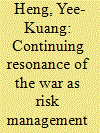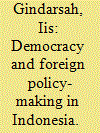| Srl | Item |
| 1 |
ID:
160735


|
|
|
|
|
| Summary/Abstract |
In the late 1990s and 2000s, a slew of books and journal articles proposed that a nexus between risk management and warfare was emerging. This article argues that risk management ideas continue to shape recent campaigns against Libya, Islamic State, Syria, and the war on terror from Niger, Yemen to Somalia. It uses existing literature on risk and warfare to examine four key aspects of contemporary interventions. First, the article evaluates the overall strategic context as security concerns shift from terrorism toward renewed great power competition. Second, it re-assesses the risk calculus for military action through the language and grammar of risk invoked by politicians. Third and fourth, it addresses the continuing reliance on air power and the managerial ethos of military operations as important features of war as risk management.
|
|
|
|
|
|
|
|
|
|
|
|
|
|
|
|
| 2 |
ID:
117736


|
|
|
|
|
| Publication |
2012.
|
| Summary/Abstract |
This article studies the impact of domestic politics on Indonesia's foreign policy-making. Serving as a non-permanent member of the United Nations Security Council (UNSC) from 2007 to 2008, Indonesia voted on two key resolutions concerning the Iranian nuclear issue. While approving international sanctions against Iran under UNSC Resolution No. 1747, the Indonesian government abstained from voting on Resolution No. 1803 which imposed additional sanctions on Tehran. This article argues that the country's changing response to the Iranian nuclear issue was a consequence of domestic opposition. The case study specifically identifies the Muslim-majority population, religious mass organizations, and political parties, as key factors which weighed upon the "risk calculus" behind Indonesia's foreign policy formulation. The article concludes that while the executive still drives the countrys foreign policy, Indonesias Parliament and social-political groups have gained new powers to influence the government into changing or even reversing existing policies.
|
|
|
|
|
|
|
|
|
|
|
|
|
|
|
|